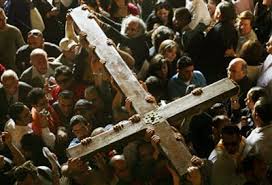 What Does “Laying Down Your Life For Your Brethren Mean?
What Does “Laying Down Your Life For Your Brethren Mean?
“This is how we know what love is: Jesus Christ laid down his life for us, and we ought to lay down our lives for our brothers. If anyone has material possessions and sees his brother in need but has no pity on him, how can the love of God be in him? (IJohn 3:16-17)
- Even nature teaches us that you cannot have life without death.
- The season of “spring” comes only after the dying of the “winter” season.
- The Christian Church was birthed through death & resurrection, thus the Easter story.
During the Lenten season, I often ask the Lord to reveal a new aspect of the Cross to me. There is so much to learn from the Cross, for it is central to the Christian faith. One year I learned the principle that “God can make beauty out of the worst possible scenario; he can make the ugliest situation the most beautiful.” The most painful, cruel, inhumane judgment the Romans executed was the crucifixion. Jesus hung beaten beyond recognition, exposed before women, and totally disgraced in front of his own mother, YET in less than three days he would be resurrected in a new body with scars but without pain for his mother and his disciples to see! The beauty of the resurrection replaced the horror of the crucifixion. When I find myself in dark spots, places of disgrace, in areas of pain and suffering, those ugly places, in hope, I look for the coming resurrection that can only be found in Jesus.
This Lenten season I am focusing on IJohn 3:16-17 as I continue to ponder over the meaning of “laying down your life for your brethren.” “This is how we know what love is: Jesus Christ laid down his life for us.” That principle I understand in my head, in my intellect, but practically in every day life the “we ought to lay down our lives for our brothers” still baffles me.
Being a retired 8th Grade English teacher for 40 years who had to teach English grammar, I am fascinated by John’s choice of pronoun here: “We ought to lay down our lives for our brothers.” The pronoun “we” is inclusive and plural. It doesn’t say “I” but “we”. We, I believe, refers to the Body of Christ, the Priesthood of Believers, the corporate Church! Today’s church is known for shooting their wounded, criticizing their brethren, debating profusely over theology and doctrine, yet hypocritically proclaims that “we” are one Church, united in Jesus! If we truly are united in Jesus, then our actions should speak louder than our words, and they don’t. When we see brothers and sisters in different Christian denominations, sects, or local churches not under the same Christian sect’s banner as our own, we do not meet their “need” nor show “pity” towards them, but judge them by “pitying” them for having a “need” as if it were judgment for their lack of faith or incorrect theology! As John and I both ask, “How can the love of God be in (us)?
Laying down one’s life is the central message of the gospel. “Jesus Christ laid down his life for us.” That single act opened the door for redemption, reconciliation, healing, hope, faith, love, etc. “And we ought to lay down our lives for our brothers,” that single act, will open the door for redemption, reconciliation, healing, hope, faith, love, etc. between brothers and sisters in Jesus Christ. The Cross ended the curse of sin that divided mankind from his God; the Cross also ended the curse that caused Cain to kill his brother Abel that has divided mankind throughout history.
 Death brings resurrection. Jesus’ body that laid in the tomb three days dead was resurrected. History was now changed forever. Only if “we”, the Church, the believers in Jesus Christ, the Priesthood of Believers, are willing to lay down our lives, dead to our past traditions and mindsets, can “we” expect to see a resurrection of life and unity in the Spirit and in the Church!
Death brings resurrection. Jesus’ body that laid in the tomb three days dead was resurrected. History was now changed forever. Only if “we”, the Church, the believers in Jesus Christ, the Priesthood of Believers, are willing to lay down our lives, dead to our past traditions and mindsets, can “we” expect to see a resurrection of life and unity in the Spirit and in the Church!
But the question still needs to be asked, “How do we lay down our lives ‘practically” in our day to day life towards each other?” What does that mean? What does it look like? What practical steps must “we” take, individually as believers in Jesus and corporately as a Church, a Body?
 As this series of blogs professes, I truly that believe by embracing the five fold as passions, drives, points of view, and diverse voices in the body of Christ to build up the saints into the image of Jesus Christ while bringing unity to the Body of Christ, every believer in Jesus Christ, every member of the Priesthood of Jesus Christ, is responsible for the “we” who are to “lay down his life for his brethren.” If I truly profess that the Church is going through a metamorphosis stage of redevelopment and structural reconstruction, then I need to focus on the “we”, the Church, part and figure out how I can lay down my life for my brethren, not for the institution nor its organization, but for my fellow brethren, real live people! This Easter “I” need to die to self; “we” need to die to ourselves, and begin to “lay down our lives” for one another! That is the price for true revival!
As this series of blogs professes, I truly that believe by embracing the five fold as passions, drives, points of view, and diverse voices in the body of Christ to build up the saints into the image of Jesus Christ while bringing unity to the Body of Christ, every believer in Jesus Christ, every member of the Priesthood of Jesus Christ, is responsible for the “we” who are to “lay down his life for his brethren.” If I truly profess that the Church is going through a metamorphosis stage of redevelopment and structural reconstruction, then I need to focus on the “we”, the Church, part and figure out how I can lay down my life for my brethren, not for the institution nor its organization, but for my fellow brethren, real live people! This Easter “I” need to die to self; “we” need to die to ourselves, and begin to “lay down our lives” for one another! That is the price for true revival!